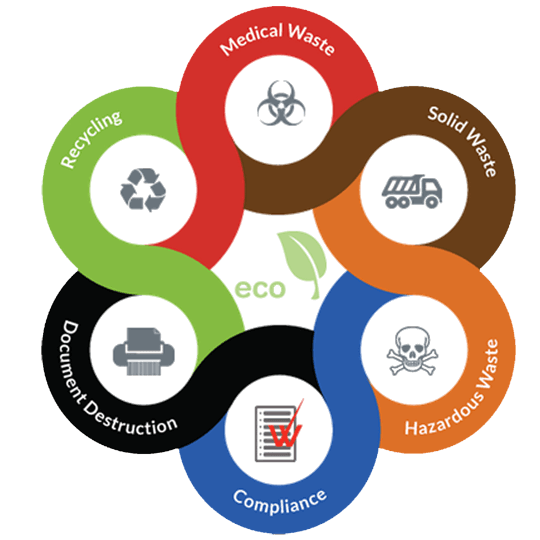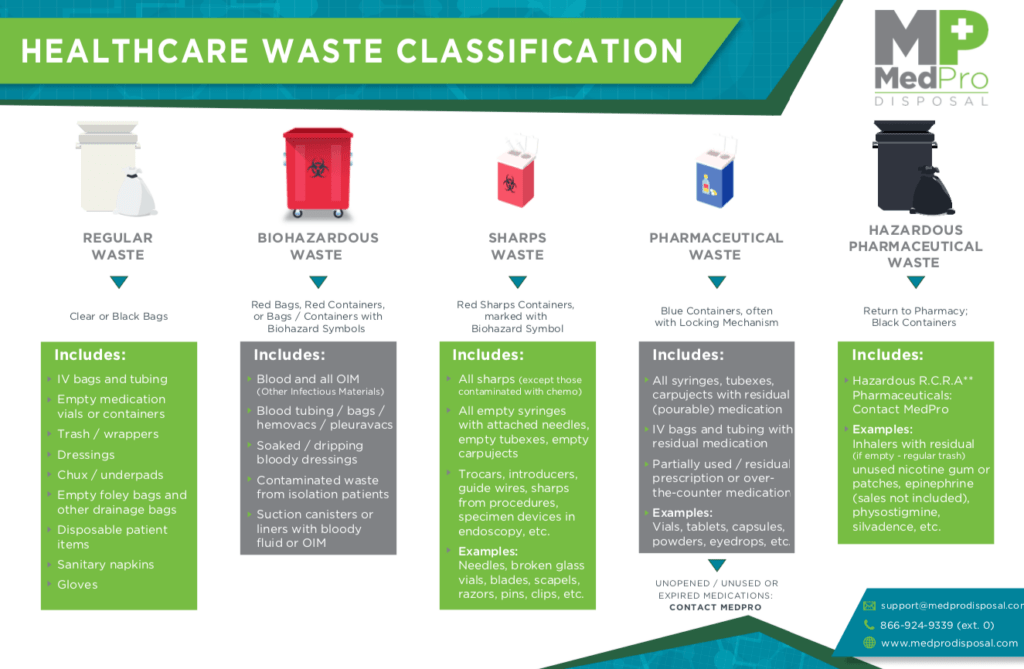Effective and Liable Medical Waste Removal: Protecting Individuals and the Planet
Wiki Article
Making Sure Safe Handling and Disposal of Medical Waste
Ensuring safe handling and disposal of medical waste is of critical significance in healthcare setups. Inappropriate monitoring of clinical waste can position considerable risks to the atmosphere, public health and wellness, and health care employees. In this introduction, we will explore the importance of correct medical waste management, the risks linked with improper handling and disposal, as well as the guidelines and techniques that can be implemented to guarantee its secure disposal.Value of Appropriate Clinical Waste Administration
Proper medical waste monitoring is of utmost value in guaranteeing the safety and wellness of health care professionals, people, and the public. Clinical waste refers to any type of waste generated by health care facilities throughout the diagnosis, treatment, or booster shot of pets or human beings. This waste can posture severe health risks if not handled and disposed of properly.
Among the key reasons appropriate medical waste administration is crucial is to stop the spread of transmittable conditions. Medical waste, such as utilized needles, infected dressings, and biological materials, can carry dangerous virus. If not taken care of and dealt with properly, these microorganisms can be transferred to health care workers, clients, waste handlers, and also the basic public, leading to the potential episode of diseases.
In addition, appropriate medical waste monitoring aids protect the environment - medical waste disposal service. Medical waste has hazardous products, including chemicals, drugs, and radioactive substances. When not managed properly, these compounds can infect dirt, water bodies, and the air, posing a significant threat to communities and public wellness
In addition, effective clinical waste monitoring ensures compliance with neighborhood policies and worldwide standards. Governments and governing bodies have actually established guidelines and procedures to make certain the secure handling, storage space, transportation, and disposal of clinical waste. Sticking to these policies is important to prevent lawful effects and preserve the track record and credibility of health care centers.
Risks of Improper Handling and Disposal

Individuals can additionally be revealed to these infectious diseases if medical waste is not appropriately gotten rid of. For circumstances, if infected needles or various other sharps are not disposed of in designated puncture-proof containers, they may accidentally prick clients, resulting in prospective infections. If medical waste is not segregated properly, there is a danger of cross-contamination between different kinds of waste, further raising the chances of disease transmission.
Improper disposal of medical waste can also have damaging impacts on the setting and the basic public. If clinical waste is not dealt with and dealt with appropriately, it can infect water sources, dirt, and air, bring about the spread of conditions and contaminants. This can have long-lasting effects on ecological communities and public wellness.
Guidelines for Safe Handling of Medical Waste
Applying efficient protocols for the safe handling of clinical waste is vital in guaranteeing the defense of health care experts, people, and the general public. These guidelines are critical in lessening the dangers associated with the handling and disposal of clinical waste, such as infections, injuries, and ecological contamination.Firstly, medical care facilities must develop a comprehensive waste monitoring plan that complies with local, national, and global laws. This plan must consist of clear guidelines on waste partition, product packaging, labeling, storage, and transportation. It is crucial to separate various kinds of waste, such as sharps, contagious materials, drugs, and non-hazardous waste, to prevent cross-contamination and advertise secure disposal.
Furthermore, healthcare workers have to obtain thorough training on correct waste handling techniques. They need to be informed on the possible threats of medical waste, the appropriate use personal safety equipment (PPE), and the right treatments for dealing with, transferring, and getting rid of different sorts of waste.
Moreover, health care facilities need to on a regular basis keep an eye on and examine their waste monitoring techniques to ensure compliance with guidelines. This consists of performing routine assessments, assessing waste handling treatments, and giving responses and training to personnel.
Reliable Approaches for Garbage Disposal
To make sure the risk-free handling and disposal of medical waste, it is vital to use efficient techniques for waste disposal. Clinical waste can present considerable threats to public health and wellness and the atmosphere if not taken care of and thrown away appropriately. Therefore, healthcare facilities and waste management organizations should implement ideal methods to minimize these threats.It includes dividing different types of clinical waste based on their qualities. Healthcare centers should give clear guidelines and training to staff members on exactly how to segregate waste correctly.

Furthermore, health care centers should collaborate with qualified waste management business to guarantee appropriate disposal of medical waste. These business have the competence and devices needed to securely take care of and dispose of medical waste in conformity with regulations and best methods.
Training and Education for Healthcare Professionals
Healthcare professionals play an important function in making certain the secure handling and disposal of medical waste via comprehensive training and education and learning. It is essential for healthcare providers to have a deep understanding of the potential risks related to clinical waste and the appropriate procedures for its administration. By receiving proper training, healthcare specialists can decrease the possible transmission of infectious diseases, prevent ecological contamination, and secure both themselves and the general public.
Moreover, training programs ought to stress making use of individual protective devices (PPE) and appropriate hand hygiene techniques when managing clinical waste. medical waste removal service. Healthcare professionals need to understand how to appropriately use and get rid of of PPE to safeguard themselves from prospective exposure to hazardous materials. They must additionally be enlightened on the importance of routine handwashing and the appropriate use hand sanitizers to minimize the spread of infectious illness
Continuing education and learning and regular updates on medical waste monitoring methods are essential for health care specialists. As policies and standards advance, it is vital to maintain healthcare carriers informed regarding any kind of changes in methods and ideal practices. This will guarantee that they remain current and maintain a high standard of security in managing and getting rid of of clinical waste.
Conclusion
Finally, proper handling and disposal of clinical waste is crucial to ensure the security of health care experts, individuals, and the environment. Ignoring to comply with guidelines and guidelines can lead to different threats and hazards. Implementing effective strategies for garbage disposal and providing appropriate training and education for WasteX Medical Waste Disposal healthcare professionals are essential in maintaining a risk-free medical care setting. By sticking to these methods, we can minimize the potential threats connected with clinical waste.Medical waste refers to any waste produced by healthcare centers during the diagnosis, therapy, or immunization of humans or pets. If clinical waste is not segregated effectively, there is a danger of cross-contamination between various types of waste, further boosting the chances of condition transmission.
It is important to divide various types of waste, such as sharps, transmittable materials, drugs, and non-hazardous waste, to prevent cross-contamination and advertise safe disposal. WasteX Medical Waste Disposal.
To make certain the safe handling and disposal of clinical waste, it is essential to employ reliable strategies for waste disposal. Furthermore, medical care facilities must develop a routine waste collection and transportation timetable to stop waste buildup and lessen the threat of mishaps or contamination.
Report this wiki page